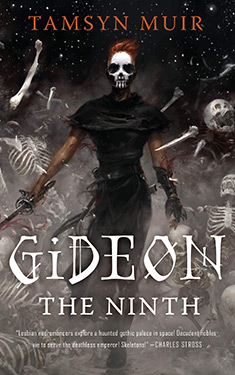Tamsyn Muir
Completed 3/30/2021, Reviewed 3/30/2021
1 star
What a disappointment! I really thought I’d like this queer necromancers in space murder mystery, but was disappointed on all counts of that description. Yes, the main characters were queer, there were an abundance of necromancers, it took place in another solar system, and there’s a lot of killing. But the world building and prose were weak, there are way too many characters (over twenty), and a protracted, forty page showdown in the end. I was bored through most of it and ended up skimming much of it. I can’t believe this book was nominated for a Hugo, Nebula, and World Fantasy Award, and won the Locus First Novel Award. This is the first book in a long time that I seriously wanted to abandon.
Gideon grew up on the world called the Ninth House. She was an orphan who grew up antagonistically with the only other child on the planet, the Reverend Daughter Harrowhawk. Finally, at the age of eighteen, Gideon has a plan to leave the planet, but Harrow tricks her into staying. Harrow convinces her to become her cavalier in answer to the Emperor’s call to each of the Houses for a necromancer and cavalier to come and contend for the role of Lyctor. A lyctor is a necromancer who becomes a personal aide to the Emperor. So, they go and are immediately thrown into a game of finding keys and unlocking the secret of becoming Lyctor. However, the contestants start dying, and the game turns into one of survival instead.
The world building starts out interestingly with the action taking place in the Ninth House. It’s a world of a strange death cult, including something locked away that’s so horrible that no one has a key for it. There are no children here, but there are a lot of nuns and priests of this cult. When the action moves to the planet with the game, things begin to fall apart. We meet all the other House necromancers and cavaliers, but we don’t get much info about their worlds, only that they seem to universally hate the Ninths. The action takes place in a massive building with lots of floors and doors. There were so many rooms explored that I never felt like I really knew where I was. And it was strange because it felt like it was a confused blend of fantasy and science fiction. I was constantly shocked by the presence of modern technology considering people walked around in robes and cloaks and there were animated skeleton servants all over the place.
The characterization was pretty weak. Gideon and Harrow are snarky and sarcastic and hate each other, but that’s really all we get. The moments of true feelings are few and far between. Then there are the fourteen other necromancers and cavaliers, a few of whom brought siblings along. The author tried really hard to give them all distinct personalities but only succeeded with a few. I kinda liked Dulcinea, a necromancer who is in the last stages of some terrible illness. She was warm to Gideon and came close to bringing real feelings out of the snarkiness. There was a list of the characters at the end of the book, which I tried to read, but only skimmed because, well, I was quite over the book at that point.
The pacing is really slow. It’s kind of like a standard teen horror flick. At first, you’re interested in the premise, but eventually, you just want to see who’s going to die next, and everything in between is just tedious.
One thing I never got was how the game of becoming the Lyctor was actually supposed to be played. There was something about finding keys to doors which took you to scary rooms. It seemed like whoever had the most keys was the winner. But of course, that game was supplanted by whoever doesn’t get killed becomes the winner.
I’ve only awarded a single star out of five a few times before. What started out as interesting ended up boring. I eventually stopped caring about the murders. Most of the characters became a blur. When the murderer is finally revealed, I was surprised, but I didn’t really care. And then there was that forty page sword and magic fight that made my eyes roll back inside my head. Occasionally, I thought to myself it was interesting in its Lovecraftian weirdness, but it just went on and on and on. I’m sorry that I bought the next book in the trilogy without reading this one first. It was a deal of the day and couldn’t pass up a bargain. I may read it just to see if the author got any better at constructing a book.

No comments:
Post a Comment